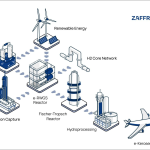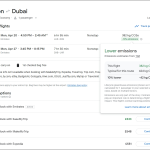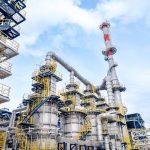A new study by European lobby group Transport and Environment (T&E) has identified commitments to build 45 e-kerosene plants in 10 European nations, with combined potential to produce more synthetic aviation fuel by 2030 than required by the EU’s RefuelEU mandate. The group says 25 of the proposals are industrial scale and 20 are pilot projects but cautions that their futures are “very uncertain” as none have yet achieved final investment decisions. The T&E tally of promised e-kerosene facilities is 17 higher than its last count late in 2022 when it listed 28 announced projects to produce synthetic fuels for aviation. The study coincides with confirmation that low-cost airline Norwegian Air Shuttle has invested in Norsk e-Fuel, which is planning to build a large-scale electrofuel (e-fuel) production facility, while Nordic Electrofuel has secured a €40 million ($44m) grant from the EU Innovation Fund towards construction of its commercial-scale e-fuel plant in southern Norway.
Synthetic fuels are produced through a pathway known as power-to-liquid (PtL) which combines carbon dioxide captured from the atmosphere or directly from industrial plants with green hydrogen, produced by electrolysing water with renewable electricity. This process is increasingly viewed as a primary future source of SAF, as CO2 provides an abundant and easy-to-acquire feedstock for alternative fuels, compared to current ingredients of used fats, oils and greases or solid waste biomass.
While the ReFuelEU Aviation regulation has been designed to de-risk SAF production by establishing escalating blending mandates to ensure long term, predictable demand, T&E says there remain significant impediments to e-fuel production, including scarce supplies of green hydrogen and sustainable carbon sources, plus reluctance by many airlines to sign purchase agreements.
“We see proposals for e-kerosene plants springing up like mushrooms around Europe,” said Camille Mutrelle, SAF Expert at T&E. “The EU could meet its 2030 target to power planes with e-fuels. But the road is still long before we actually see e-kerosene in our planes. We need to move from paper to reality and ensure that e-kerosene projects truly materialise, or else the law will be nothing but empty words.”
ReFuelEU Aviation requires jet fuel suppliers to include e-kerosene in the blended supplies they deliver to EU airports, beginning with 1.2% in 2030 and increasing to 35% by 2050.
The study says the 25 industrial projects identified by T&E have the ambition to produce 1.7 Mt of e-kerosene by 2030 – well over the 600 kt obliged under ReFuelEU, and sufficient to power the equivalent of 70,000 transatlantic flights, while avoiding a total of 4.6 million tonnes of CO2 emissions.
Of the 10 countries assessed, it found Norway, Germany and France to be the leading proponents of e-kerosene production. Norway’s e-kerosene plans are the most advanced in the markets surveyed, with total production capacity of 420,000 tonnes planned in 2030, and two of its companies, Nordic Electrofuel and Norsk e-Fuel, targeting almost 25% of the European market.
Germany is targeting 0.5% e-kerosene use at its airports from 2026, increasing to 2% in 2030, while France has committed €200 million ($220m) to support innovative SAF programmes.
The study adds that Norway, France, Germany and Sweden are attracting most investments in e-kerosene projects and says 80% of production is likely to be in these countries, “whereas Italy, Poland, Belgium, and, more broadly, eastern European states, are nowhere to be seen on the map.”
T&E’s e-kerosene research reveals a two-speed Europe, said Mutrelle. “While countries like Norway, Germany and France are pulling ahead in the e-kerosene race with some promising projects on the horizon, other countries like Spain, Italy and Poland are lagging behind and not making use of their potential,” she said.
“Ramping up the production of e-fuels for aviation should be a priority of national aviation decarbonisation strategies. Europe needs all the e-kerosene it can produce in order to convert dreams of more sustainable flights into reality.”
T&E said impediments to scaling up e-kerosene production in Europe include a lack of incentives to supply the fuel before 2030, limited availability of renewable hydrogen and carbon sources, insufficiently targeted EU funding for hydrogen use in hard-to-electrify sectors including aviation and shipping, and high production costs, the latter a significant barrier to securing offtake agreements with airlines.
The study therefore recommends prioritising the use of e-fuels in aviation and shipping, more EU funding focus on the use of hydrogen in these sectors, “meaningful” direct air capture policy incentives to increase CO2 transformation to fuel and establishment by EU states of pre-2030 targets to boost early supply of e-kerosene.
Interactive map of planned major e-kerosene projects in Europe (source: T&E)
Confirming Norway’s e-kerosene leadership, low-cost airline Norwegian has just formalised an initial investment of more than NOK 12 million ($1.1m) in Norsk e-Fuel, as part of the carrier’s commitment to reduce its aircraft CO2 emissions 45% by 2030, and to secure assured supplies of SAF.
Norsk plans to build what it claims could be the world’s first large-scale production facility for e-fuel at a site in Mosjøen, northern Norway, close to the Arctic Circle. The companies say SAF could be flowing from the Mosjøen plant from late 2026.
The airline will secure more than 7,000 tonnes of fuel per year from the initial plant, a volume it says corresponds to its total fuel consumption in carrying 430,000 passengers between Oslo and Bodø in the country’s north-west – almost 80% of the 550,000 passengers the airline carries each year on that route.
It has pledged to invest a further NOK 40-50 million if plans for two additional factories progress, potentially increasing its SAF supplies from Norsk e-Fuel to 29,000 tonnes per year.
“This agreement marks the start of a pioneering partnership that will accelerate the transition to fossil-free fuels in aviation and give us access to a product that will be available in limited quantities,” commented Norwegian’s CEO, Geir Karlsen. “Increased production of this type of fuel is essential in the years to come if we are to succeed in the transition to more sustainable aviation.”
Norsk e-Fuel’s CEO, Karl Hauptmeier, said his company has ambitious plans to increase production, and the commitments of Norwegian and other partners “show the understanding of the critical role of e-fuels in shaping a future for aviation that is free from fossil fuels, both in Norway and across Europe.”
In addition to supplying Norwegian, Norsk e-Fuel has signed an e-kerosene offtake agreement with cargo operator Cargolux.
“E-fuel will be a major pillar to achieving net zero carbon emissions by 2050 in aviation,” said Richard Forson, CEO of Cargolux. “E-fuels are based on abundant feedstocks such as carbon dioxide and when produced with green electricity, the Norsk e-Fuel project will provide one of the highest greenhouse gas savings compared to conventional jet fuel. We look forward to offering our customers the option to have the ability to voluntarily enhance the sustainability initiatives through the use of e-fuels for their shipments as of late 2026.”
Norsk e-Fuel has also just signed an agreement with Gen2 Energy on the supply of green hydrogen for use as a feedstock for the Mosjøen facility. The two companies will have neighbouring plots at the Nesbrucket industrial site, where Gen2 Energy is planning large-scale production and supply of green hydrogen. As well as supplying Norsk e-Fuel, and subject to an investment decision later this year, Gen2 Energy is targeting export of green hydrogen to offtakers in Europe.
Direct air capture technology from Climeworks will be integrated in the production process, filtering CO2 from the atmosphere, with electrolysers from Dresden-based Sunfire at the core of the conversion process.
Vying with Norsk e-Fuel to build the world’s first commercial-scale aviation e-fuels production facility, Nordic Electrofuel has been awarded a €40 million ($44m) grant from the EU Innovation Fund’s pilot programme to support the construction of its plant at Herøya Industrial Park, Porsgrunn, in southern Norway.
In June last year, the company entered into a collaboration with Hamburg, Germany-based PtL technology company P2X-Europe for the long-term supply of synthetic fuels, in particular e-fuels for aviation (eSAF). Nordic Electrofuel will produce synthetic crude in Norway, which P2X-Europe will upgrade to eSAF and other synthetic products. Initial production and supply volume has been set at around 8,000 tonnes per annum, with plans for future production scale-up.
Top image: Illustration of the proposed 24,000-square-metre Norsk e-Fuel Mosjøen facility













More News & Features
Concrete Chemicals consortium secures €350m public funding for German eSAF project
New studies confirm minor flight re-routing to avoid contrails would have major climate benefits
EU SAF mandates will have to be revised, predicts French oil chief
Swiss advanced SAF technology startups Metafuels and Synhelion reach project milestones
PtX fuels have significant Asia-Pacific potential but face many barriers, finds report
EU states to mobilise 500 million euro support for early-mover eSAF production startups